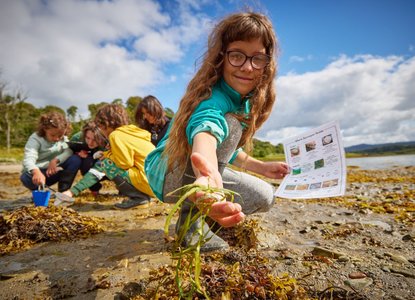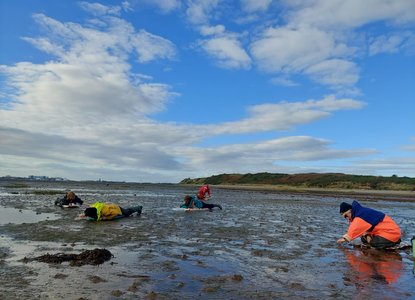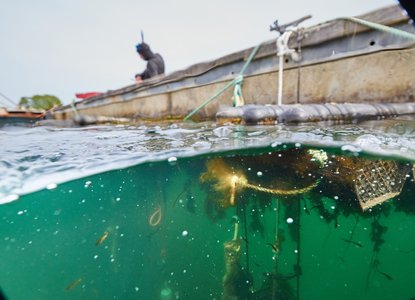We’re excited to share a new two-part report by Pelagos Consulting on how to scale and sustain marine recovery across the UK. Watch our webinar with the report's author, David Tudor, to explore the findings. Morven Robertson, Esmée’s Funding Manager, also reflects on what this means for our future approach to funding and support towards seascapes.
The two-part report, From Decline to Revival: Restoring the UK Marine Environment, sets out to understand how marine recovery can be scaled up and sustained across the UK. It explores the current landscape of marine conservation and restoration, identifies barriers and opportunities, and offers strategic recommendations for funders, practitioners, and policymakers. The findings draw on a comprehensive literature review, stakeholder interviews, a national webinar series, and an advisory group roundtable.
Watch our webinar exploring the findings
The webinar was hosted by Liam McAleese, Esmée's Director of Our Natural World, and included the report's author, David Tudor from Pelagos Consulting, and Esmée Funding Manager, Morven Robertson, who leads on our marine-focused work.
- Download the presentation slides shared by David and Morven
- See the transcript and additional written Q&A
Outline of the webinar: Click on a timestamp below to go directly to that section in the recording on YouTube.
- 00:00:00 Welcome and introductions
- 00:02:40 Background
- 00:04:47 Report findings
- 00:25:00 Reflections from Esmée and next steps
- 00:37:10 Q&A
Report and blog: Below, you can find Parts One and Two of the report, and a blog from Morven sharing our reflections so far. We'd love to know what you think. Get in touch by email - details at the bottom of Morven's blog.
From Decline to Revival report
Download the report: From decline to revival
Part One: Views from the sector
Part One shares the results of a series of interviews and a workshop with practitioners working in UK marine, as well as a full set of recommendations for funders, government, practitioners, and communities.
Part Two: The current UK context
Part Two sets out, at a high-level, the UK context for the marine environment and aims to be relevant to the full range of practitioners, from new entrants to experienced specialists. It aims to act as a compendium and general resource.
Download or view part two of the report in full screen. If you would like to see the report in an alternative format, please email communications@esmeefairbairn.org.uk.
next steps
Learning from the report: Next steps for seascape restoration
We recently reviewed progress towards Esmée’s 2020-2027 strategy for two of Our Natural World priorities with marine focused outcomes. For our Space for Nature priority we identified seascape scale restoration, which is about protecting and restoring degraded marine and coastal ecosystems at scale, as a key action.
Around the UK, the marine environment is in a perilous state, with widespread habitat degradation and species loss undermining and removing the ecosystems services they provide. Public awareness of these issues is at an all-time high, boosted by David Attenborough’s recent Oceans film, so the time to act is now. However, as on land, there is a need to scale up efforts if we are going to restore the marine environment and meet internationally agreed targets, such as the protection of 30% of globes land, rivers and seas by 2030.
Over the last year we have worked with Pelagos Consulting to develop our thinking around seascape restoration and understand where our support can make the most impact. This has been a robust and useful process that has informed our direction of travel. Over 30 representatives from communities, NGOs, government, developers and academics were interviewed for the report.
Part of this work has sought to connect, convene and share learning among those working to restore the marine environment in the UK. For example, over 2400 people engaged with the webinar series delivered in association with the Environment Agency ReMeMaRe initiative, by Ocean and Coastal Futures. The webinars brought together experts and professionals to discuss the practicalities of marine restoration, including the necessary political, scientific, and financial support. We also supported a Zoological Society of London led Seascape Symposium bringing together practitioners in the UK and globally to share knowledge and expertise.
The report sets out detailed recommendations with key themes including rethinking funding models, centring communities, adopting systemic approaches, embedding climate resilience, strengthening collaboration, and ensuring long-term sustainability. Together, these point to a shift in how marine recovery must be resourced: long-term, inclusive, systemic, and collaborative. The challenge now is to translate these principles into concrete mechanisms capable of driving seascape-scale restoration at pace.
The need for funders to collaborate
The report makes a strong call for funders to collaborate and be more strategic in their approach. Philanthropic support for the marine environment remains limited, especially in the UK where it is a niche within an already underfunded sector. In 2021–22, only £5.3 million went to marine and coastal ecosystems, according to the Environmental Funders Network’s 2024 Where the Green Grants Went report, with funding spread in a scattergun way. Short-term, small grants are the norm with just a handful reaching a value of more than £1 million. These are not the kinds of figures that can support large-scale, long-term marine recovery. We are also mindful that for funders like us who can’t fund capital costs we have a specific role to play that can complement other funding streams. Funder partnerships are a key recommendation in this report and one that we are committed to developing with others to enable seascape restoration to scale and grow.
What next for Esmée
We want to balance continued support for proven, high-impact organisations with investing in innovative disruptors and new ideas. Based on the learning from this review and our insights from our Blue Spaces programme and recent Freshwater review, this will focus on three areas.
Building sector capacity and tackling systemic barriers
The report underscores the need for stronger joint working between seascape projects and greater support for collaboration to address systemic barriers. Challenges such as complex licensing, fragmented governance, limited expertise, and under-resourced organisations too often slow progress. Building on our strengths, we are committed to funding core costs that grow long-term capacity—from supporting policy and advocacy roles that drive legislative change, to creating platforms for cross-sector knowledge exchange and collaboration. By strengthening organisations’ skills, voices, and connections, we aim to accelerate collective action and create the conditions for ambitious marine restoration to thrive.
Place-based seascape restoration
The report highlighted a strong need for greater action on the ground to increase the capacity of partnerships and enable diverse and inclusive collaborations. We’re interested in supporting place-based projects and partnerships that are taking a whole systems approach. Given the links between farming, fisheries, freshwater, and marine environments, we will prioritise work that explores these intersections and are led by partnerships across land and sea.
Strengthening the role of coastal communities
Recent reports from Scottish Environment Link underscore the vital role of communities in restoring UK seas, calling for fewer barriers and more funding for local projects. Building on initiatives like Seawilding and the Coastal Communities Network, we will deepen our support by connecting groups, identifying priorities and strengthening capacity identifying priorities from 2026.
Let us know your thoughts
We hope you enjoy reading the report. We are considering our next steps on this work and are keen to hear your views and feedback. To share your thoughts, send an email to morven.robertson@esmeefairbairn.org.uk
We also want to say a big thank you to everyone who shared their views for the report, and to Pelagos Consulting for their work.


